The SSD Anthology: Understanding SSDs and New Drives from OCZ
by Anand Lal Shimpi on March 18, 2009 12:00 AM EST- Posted in
- Storage
PCMark Vantage
Next up is PCMark Vantage, another system-wide performance suite. For those of you who aren’t familiar with PCMark Vantage, it ends up being the most real-world-like hard drive test I can come up with. It runs things like application launches, file searches, web browsing, contacts searching, video playback, photo editing and other completely mundane but real-world tasks. I’ve described the benchmark in great detail before but if you’d like to read up on what it does in particular, take a look at Futuremark’s whitepaper on the benchmark; it’s not perfect, but it’s good enough to be a member of a comprehensive storage benchmark suite. Any performance impacts here would most likely be reflected in the real world.
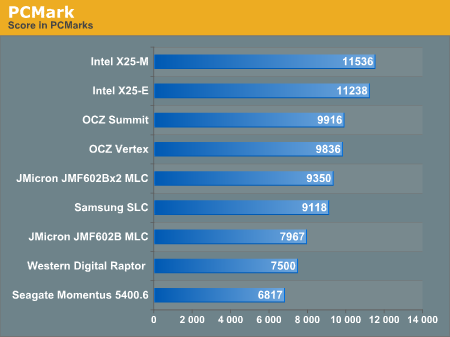
If you've paid attention to the synthetic tests from the previous pages, the results here should make sense. The Intel drives take the top two spots followed by the two OCZ drives, then the JMicron and conventional HDDs take up the rear.
While PCMark does do a great job of measuring disk performance, it doesn't seem to stress random write performance as much, allowing the JMicron drives to relax a bit.
Now let's look at the individual test suites:
The memories suite includes a test involving importing pictures into Windows Photo Gallery and editing them, a fairly benign task that easily falls into the category of being very influenced by disk performance.
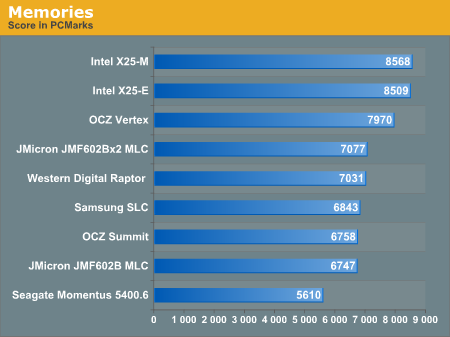
The TV and Movies tests focus on on video transcoding which is mostly CPU bound, but one of the tests involves Windows Media Center which tends to be disk bound.
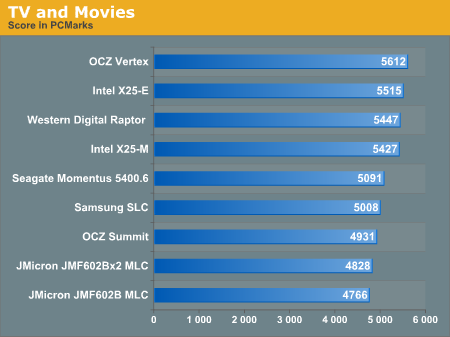
SSDs won't always dominate and in many cases they won't offer tangible improvements over a fast hard drive.
The gaming tests are very well suited to SSDs since they spend a good portion of their time focusing on reading textures and loading level data. All of the SSDs dominate here, but as you'll see later on in my gaming tests the benefits of an SSD really vary depending on the game. Take these results as a best case scenario of what can happen, not the norm.
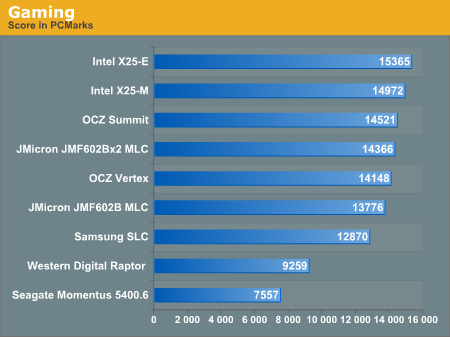
In the Music suite the main test is a multitasking scenario: the test simulates surfing the web in IE7, transcoding an audio file and adding music to Windows Media Player (the most disk intensive portion of the test).
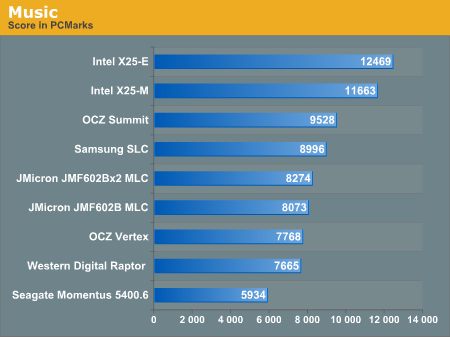
The Communications suite is made up of two tests, both involving light multitasking. The first test simulates data encryption/decryption while running message rules in Windows Mail. The second test simulates web surfing (including opening/closing tabs) in IE7, data decryption and running Windows Defender.

I love PCMark's Productivity test; in this test there are four tasks going on at once, searching through Windows contacts, searching through Windows Mail, browsing multiple webpages in IE7 and loading applications. This is as real world of a scenario as you get and it happens to be representative of one of the most frustrating HDD usage models - trying to do multiple things at once. There's nothing more annoying than trying to launch a simple application while you're doing other things in the background and have the load take seemingly forever.
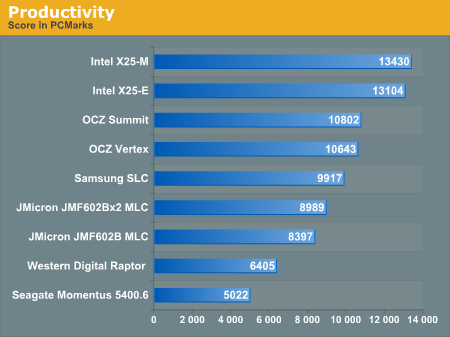
The results here are the best characterization of my personal experience with the drives. The Intel drives are the fastest, a good 25% faster than the Summit or Vertex. Next up are the OCZ drives, with the Vertex dangerously close to the Summit. The older Samsung SLC is next in the standings, followed by the JMicron drives. There's a healthy combination of reads and writes going on here which benefits all of the SSDs, including the less desirable ones.
The final PCMark Vantage suite is HDD specific and this is where you'll see the biggest differences between the drives:
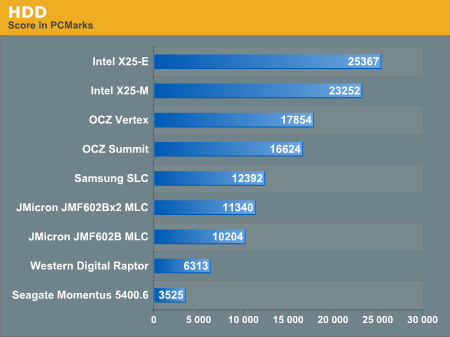
Again we're seeing the sort of breakdown we'd expect. The Intel drives come out ahead, while the Vertex is the best bang for your buck.










250 Comments
View All Comments
KadensDad - Tuesday, October 27, 2009 - link
How do these drives fail? I have heard that they will just suddenly die, no more writes or reads possible. What I would like to know is what happens when it dies? Do you lose all data? Just can't write anymore? How does the OS respond? Any early warnings? What about e.g. CRC? How does possibility of data corruption compare to traditional SSD? What about RAID? Since the drives are electrical, not mechanical, this reduces the number of failure vectors and environmental concerns (e.g., ambient temperature over lifetime of the drive). Won't SSDs therefore fail closer together in time in a RAID configuration? This reduces the window of opportunity for fixing an array and also decreases the applicability of RAID, however marginal.adsmith82 - Monday, September 14, 2009 - link
I need to run HDDErase on an X25-M. No matter what bootable CD or flash drive I create, HDDErase does not see either of my SATA hard drives. I already disabled AHCI in BIOS. Also, I am using version 3.3. I know that 4.0 does not work with the X25-M.Can someone help me troubleshoot this please? Thanks.
gallde - Thursday, June 11, 2009 - link
You point out that TRIM will only work on deletions, not on overwrites. But, couldn't a smart controller look at blocks that have a majority of invalid pages and "trim" them as well, recovering clean pages as a background process?forsunny - Thursday, August 13, 2009 - link
Why not just make the SSDs capable of individual page erases instead of blocks? Problem solved.Ron White - Sunday, August 31, 2014 - link
Erasing the NAND transistor in an SSD requires such a large jolt of voltage that it would affect surrounding transistors.lyeoh - Friday, May 29, 2009 - link
Good and informative article.Regarding the shill tshen83 who claims that Anandtech cost the drive manufacturers millions of dollars in sales.
If that is true, Anandtech has saved customers millions of dollars.
Anandtech should care more about their readers losses than drive manufacturer losses. If Anandtech was a site for drive manufacturers and their shills we wouldn't be reading it.
To me, if the SSD drive manufacturers lose money, it's their own fault for building crap that has higher write latencies than old fashioned drives with metal discs spinning at 7200RPM or slower. Not anandtech's.
I can get higher sequential reads and writes by using RAID on old fashioned drives. It is much harder to get lower latency. So Anandtech did the right thing for OCZ.
Lastly, there might be a way of making your windows machine stutter less even with a crap SSD. Note: I haven't tested the actual effect on an SSD because I don't have an SSD.
Basically by default when Windows accesses a file on NTFS, it will WRITE to the directory the time of the access. Yep, it writes when it opens files and directories (which are just special files). That might explain the stuttering people see. For a lot of things, Windows has to open files.
Warning! There are reasons why some people or programs would want to know the last access time of files. Me and my programs don't (and I doubt most people would).
If you are sure that's true for you (or are willing to take the risk) set NtfsDisableLastAccessUpdate=1 as per:
http://technet.microsoft.com/en-us/library/cc75856...">http://technet.microsoft.com/en-us/library/cc75856...
poohbear - Sunday, April 26, 2009 - link
Brilliant article and very informative on these emerging technology. I wont be buying one anytime soon @ their prices, but good to know we'll FINALLY be replacing convential HDD which are the one component that have been pretty much the same since as far back as i can remember"SSDs have +5 armor immunity to random access latency"
rofl that's the best analogy i've seen on a hardware review site. is every comp geek a RPG geek @ heart?
Gootch - Sunday, April 19, 2009 - link
Great article. Realy made me understand what I need to look at before making the plunge. Mistakes and all, my compliments. As for value between the now seemingly drastically improved Vertex vs the X25-M, I compared prices between the two and per Gb, the Intell product for say an 80 Gb drive is Can $5.86/Gb, while the OCZ 60 Gb SSD is Can $6.81/Gb. Now that we are no longer comparing apples and oranges, I think we need to point out that the Intel product is not only faster and maintains it's performance edge better, but it is cheaper per Gb. At least in Canada. I have many OCZ products and I love the company and it's customer support. I can only hope that they will make their SSDs more competitive in the near future, because most consumers will pay the extra 70 bucks and go with the X25 when they pay attention to the numbers, both performance and price.Baffo - Saturday, April 11, 2009 - link
I could forsee a whole host of issues with encrypting SSD drives, not the least of which is essentially making the drive completely "used" outside of the drive slack space - which would be a temporary reprieve for the reasons discussed in this article. However, I could also see potential performance and lifetime issues since modern encryption uses streaming ciphers (e.g. an entire encrypted block - which may or may not conform to the physical block size will be changed for even one bit change within the block itself). Has anyone looked at the resultant effect on performance due to using encryption - it would be good to compare say Bitlocker, PGP, Checkpoint, and an open source encryption solution (Crypt or something like that?). This could actually become a real driver for moving to on-drive encryption where it would have the opportunity to optimize the encrpytion for the pro/cons of the SSD architecture.brandensilva - Friday, April 10, 2009 - link
Great article! I respect that OCZ made the necessary changes to make this drive work. I'd rather take a slightly slower drive if it meant consistent performance.If my hard drive started to stutter I'd flip out! I'm glad that they took the feedback and instead of selling faulty drives, that would ultimately hurt their brand, they decided to go back to the drawing board and iron out the kinks. I'm not expecting them to compare to Intel's 25-M per price or performance. They don't have nearly the cash or manufacturing capacity to compete with Intel but they do have that small business feel with receiving feedback and making improvements, which is important to customers.
Lets hope they continue to utilize that aspect of their business and further improve on their products and bring us some reliable SSD's in the future.